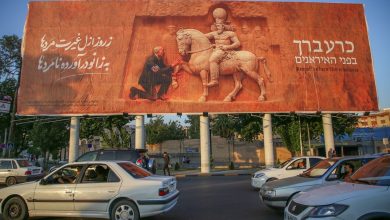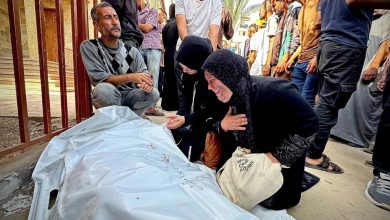Gaza’s Infants Face Starvation: Milk Shortages and Bitter Lentils Plague Region
In Gaza, existence has transitioned from a measure of time to a relentless struggle for survival, while childhood is overshadowed by silent cries on the shoulders of helpless mothers. Amidst tattered tents and nearly abandoned hospitals, mothers are left with no choice but to nourish their infants with lentil soup. There are no substitutes, no medicines, and no milk available.

In Gaza, existence is marked by survival rather than the passage of time, with childhood defined by silent tears held by mothers unable to alter the course of their children’s lives.
Beneath tattered tents and in hospitals echoing with desolation, mothers resort to feeding their infants with “lentil soup” as the sole available nourishment. There are no alternatives, no medicine, no milk, and cries for help continue to fall on deaf ears.
Gaza faces a dire crisis as the shortage of essential supplies, such as milk, compounds the struggles in the region. Within the waning infrastructure of the Nasser Medical Complex in Khan Yunis, medical professionals are confronted with the heartbreaking challenge of caring for numerous premature infants, many of whom are suffering from a lack of necessary resources.
Stocks of infant formula and therapeutic milk, essential for the survival of many young children, have been completely depleted. These crucial supplies are absent from pharmacies, unavailable in warehouses, missing from markets, and out of reach for anxious mothers.
A doctor from the facility described the harrowing situation as more than just a shortage, labeling it a total breakdown of the right to life. He reported that infants are dying unnoticed and sounded the alarm that the dwindling reserves of “Formula No. 1” in the incubators could be depleted within a matter of hours.
On Al-Jalaa Street, amidst the makeshift conditions of a tent assembled due to the ongoing siege, Azhar Muhammad offers her daughter lentil soup as an alternative, unable to procure any infant formula.
A three-month-old infant, identified as Hoor, has fallen victim to intentional starvation strategies. Currently battling diarrhea and dehydration, medical professionals have cautioned that her situation is likely to deteriorate in the absence of adequate nutrition.
The price of a can of formula, which previously was only a few dollars, has soared to $90, a cost that is unattainable for many in the face of rampant unemployment and intentional economic downturn.
Following only a brief period of five days of nourishment, the mother is compelled to resume her quest, scouring markets, hospitals, and observing the expressions of passersby.
The Ministry of Health in Gaza has announced a complete depletion of all therapeutic formulas for premature infants, including LF, AR, Isomil, and soy-based milk.
The dwindling reserves are being allocated solely for the most critical situations. Al-Rantisi Children’s Hospital, typically reliant on 500 cans of therapeutic milk monthly, now finds itself with only the recollection of such vital resources.
In a disturbing revelation, a total of 5,119 cases of severe malnutrition were documented among children under the age of five in May, with 636 instances classified as acute malnutrition, effectively signaling a famine situation. Reports from the World Health Organization have confirmed that a minimum of 55 children have succumbed to hunger.
Despite Israel’s inclusion on the United Nations’ list for serious violations against children, the international community has largely remained silent as these offenses persist without interruption.
The border crossings continue to be sealed, impeding the flow of humanitarian assistance and leveraging starvation as a tactic of systemic extermination, in direct contravention of Article 8 of the Rome Statute of the International Criminal Court.
The crime has been recorded, the victims identified, the silence brought to light, yet justice remains delayed.
The images of infants in incubators in Gaza evoke scenes reminiscent of apocalyptic films, where famine claims the lives of the innocent, and humanity teeters on the edge of political strife. An infant, clearly not a combatant, and lentils, unmistakably not milk, highlight the dire humanitarian conditions faced by the most vulnerable.
The children remain unaware of terms like “border closure” and “blacklist,” and cannot distinguish between milk and “lentil soup,” yet they are all too familiar with the concept of hunger.
The persistent prohibition on the importation of therapeutic milk, food, and medicine, notwithstanding directives from the International Court of Justice, underscores the severe humanitarian crisis unfolding in Gaza. Observers argue that these actions constitute more than just a siege; they characterise it as a silent genocide.
A silent crisis unfolds as the youngest and most vulnerable in Gaza face dire circumstances. Infants such as Baby Hoor, those at Nasser Hospital, and the premature babies at Al-Rantisi find themselves in peril, gripped by the specter of hunger and quiet mortality amid the haze of regional conflict. The urgency of their plight calls for global attention and action.
The harsh realities of life in Gaza are stripping childhood away from its youth, leaving mothers distraught and infant lives encapsulated in empty baby bottles.
The children are seeking not sympathy, but the legal right to survive. Their mothers request only one essential need: the ability to nourish their babies with sustenance that will ensure their survival.







